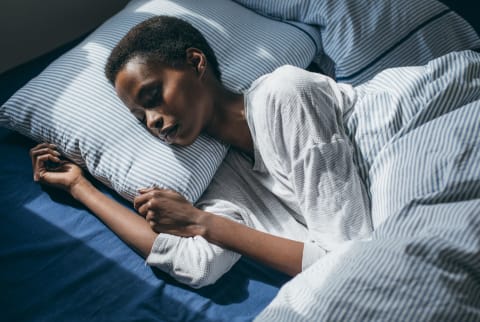Advertisement
Having Trouble Sleeping? Can't Stay Asleep? These 10 MD-Approved Tips Are Actually Proven To Work


So you can't sleep? You're in good company (read: nearly everyone these days), but it's still a lousy problem. Chronic sleep deprivation can make you depressed, anxious, prone to getting sick, at higher risk for cancer, and it makes you more likely to gain weight and develop diabetes and dementia. And of course it doesn't feel good to be jolted awake by an alarm when your body is screaming: No! I haven't gotten enough sleep yet.
Let's try to solve this problem right here and now, in ten steps—because you're tired, and that's about all you can handle at the moment:
1. Get the phone out of the bedroom.
This is the single most effective change you can make. When we keep the phone on our bedside table, it's the last thing we look at before bed. The blue light from the screen jacks up your circadian rhythm,1 and the activities of the phone (dings, pings, stressful work email, addictive social media apps, the emotional roller coaster of online dating, riveting Netflix shows, and the existential angst of geopolitical news) does not cultivate a state of mind conducive to sleep. I know what you're gonna say: but it's my alarm clock! Cool, we've got a solution. Go and pick out a lovely little analog alarm clock, and once it arrives, that's the day you set up your charger outside of the bedroom and step into your new phone-free bedroom (and new life as a better sleeper).
2. Take magnesium.
I like magnesium glycinate for sleep.* Taking 400 to 600 milligrams at bedtime can be great for relaxing your mind and your muscles and helping you fall deep asleep.* Another good supplement to keep on hand is melatonin. I don't have my patients take this regularly, but it's a great tool for managing jet lag. Take it on an overnight flight (be sure to wear compression socks and walk around frequently), and take it at bedtime once you arrive at your destination.
3. Waking up in the middle of the night? Pay attention to your blood sugar.
Show of hands-—who here has difficulty staying asleep through the night? Do you wake up at 2 a.m. or 4 a.m. or 5 a.m., jolted awake in a mild panic? This can have many underlying causes, from excessive stress to sleep apnea. But a common yet underappreciated cause is a dip in blood sugar. Because the modern American diet is built on a bedrock of sugar, refined carbohydrates, and—let's be honest—red wine, most of us ride around on a blood sugar roller coaster: Voracious hunger leads us to consume sweet, instantly gratifying food, which gives us a sugar high that leads to a sugar crash, which triggers voracious hunger…and so on and so forth.
The thing is, we're not immune to these sugar crashes in the middle of the night. And when they happen, it induces a stress response in your body. It's like being hangry, only you're asleep. Sleep hanger can jolt you awake and make you feel anxious, stressed, and wired.
Prevent sleep hanger by: a) transitioning your diet away from sugar and refined carbohydrates toward a Whole30 or paleo-template diet based on real food (meat, fish, eggs, poultry, veggies, fruit, nuts, seeds, fermented foods, healthy fats, and relying on starchy vegetables as your source of carbohydrate); b) take a spoonful of almond butter or coconut oil (not actually "pure poison") right before bed, and take another in the middle of the night if you wake up.
4. Think about your caffeine consumption—yes, actually.
I know you're inclined to skip this section because you're like: Duh, I know caffeine can keep you awake, but it's OK, I just have one or two innocent cups of coffee in the morning, and that coffee is part of my identity, so this is not gonna change.
The thing is, those innocent cups of coffee in the morning may still be contributing to your insomnia. Caffeine is slowly metabolized in the body, so even though you drink it in the morning, some of it is still buzzing around your brain at bedtime. It can make it harder to fall asleep and stay asleep, and it can decrease the quality of your sleep.
You're an open-minded, flexible person, committed to wellness and up for a challenge, right? If you struggle with any aspect of sleep, it is worth your while to gradually reduce caffeine and see how you sleep and feel once you're down to zero caffeine. Zero caffeine?! Yes, zero caffeine. Some of us are sensitive. And anybody with sleep struggles has a pretty good chance of being one of those people. If anxiety is also your thing, the odds are even higher that you're sensitive to caffeine and it's affecting your sleep and your anxiety. Gradually decrease caffeine to zero over the course of a week or two, and behold how well you can sleep when caffeine isn't messing with your brain.
5. Try an earlier bedtime.
I know I didn't make any friends asking everyone to quit coffee, and now I'm just going to dig this hole deeper. You will sleep better if you go to bed earlier. The body likes to be in sync with the rhythms of the sun and moon. This used to be nearly unavoidable because the sun would set and things would get pretty dark, dangerous, and boring. Because of electricity, the modern evening is a high-voltage festival of light, from Instagram feeds to television shows.
Start to notice that your body experiences a wave of feeling tired approximately three hours after sunset. Shockingly, this is actually the appropriate bedtime, not midnight. Start to listen for your body's tired signs around 10/10:30 p.m., and take that as a cue to brush your teeth and crawl into your cozy bed. This will prevent your body from getting "overtired," when you release the stress hormone cortisol and hit a second wind of energy. When you try to push against cortisol to fall asleep, you toss and turn and your mind races. No fun. Prevent this by swooping yourself to bed at the sweet spot of tiredness, right around 10 p.m.
6. Be strategic about light.
Light is the primary cue for our circadian rhythm (sleep-wake cycle). On the proverbial Savannah, this system was foolproof—after sunset, the only light you could see was fire and moonlight. Modern human life is an entirely different story—we spend our days sitting in windowless cubicle mazes, and then the evening is a Technicolor light show of phone, tablet, TV, and laptop screens, on a backdrop of overhead lighting and ambient light pollution outside our windows. Our body misses the cue that it's nighttime and we should feel sleepy. Get strategic to create Savannah light conditions in modern life.
Here's how: Get bright light during the day. Open your blinds as soon as you wake up, and be sure to spend at least some time every day outside in broad daylight.
And experience darkness at night. Dim the lights in your home after sunset, finish the night with a candlelit bath or by reading a paper book in bed by dim lighting. Set your phone on night shift mode and download f.lux on your computer to make the screens dimmer and less blue at night. If you're going to work on the computer, watch TV, or look at the phone at night, consider wearing glasses to block the circadian-disrupting blue light.
As thoroughly discussed above, don't bring the phone into the bedroom. In fact, try to get all electronics out of the bedroom. If your room isn't completely dark once you've turned out the lights, wear an eye mask to sleep or consider getting blackout shades (this ends up being less of an ordeal than it sounds). Finally, if you wake up in the middle of the night, try not to let your eyes "see" any light. You can install an orange night light in the bathroom and do the squinting shuffle, keeping your eyes mostly closed when you go to pee.
7. Consider alcohol.
I would be remiss if I didn't point out that alcohol disrupts sleep architecture. Though it can make it easier to fall asleep, it decreases the quality of sleep and makes it harder to sleep through the night. We also wake up feeling less refreshed the morning after we've been drinking. Bring consciousness to your choices around alcohol. If sleep is a sore point for you, it's worth your while to limit alcohol to a drink or two a couple of nights of the week (or, hey, none at all?).
8. Try jujube.
Jujube is another supplement worth considering.* It’s a plant-based supplement with antioxidant properties that can also help with sleep, stress, anxiety and even digestive issues (i.e., all that ails us modern human people). It promotes sleep by modulating GABA and serotonin activity in the brain.* Just be sure to mention jujube to your doctor before starting it, since it can have interactions with other medications, and it can impact certain health conditions, such as diabetes.
9. Experiment with GABA.
Finally, GABA itself is a supplement worth considering.* While there’s no question that the neurotransmitter GABA has profound impacts on sleep, there is some debate about whether supplemental forms of GABA effectively cross the blood-brain-barrier—that is, do they really get to your brain and have an impact. High-quality GABA supplements attempt to address this by designing the GABA to cross into the brain.* There is some evidence that GABA supplements improve sleep, but it’s also possible that the supplements carry out their effect in other ways, such as impacting the gut microbiome to increase GABA.* Regardless, GABA is worth considering at doses around 100-200mg for insomnia after a conversation with your doctor about potential interactions.
10. Wind down.
We'll wind down this article with a final note about winding down in the evening. Too many of us are trying to eke out every last drop of productivity from our days, closing the laptop seconds before brushing our teeth, answering a final work email from bed, attempting to go 60 to zero from work mode to trying to fall asleep. It doesn't work. Think of it this way—your brain needs a little foreplay to fall asleep, and answering work emails or modeling something in Excel is not sexy.
Give yourself the gift of an hour, a half-hour, 10 minutes, even just five minutes—some amount of winding down before you hit the pillow. Good options include taking an Epsom salt bath by candlelight, reading a calming paper book in bed, journaling, doing a gratitude practice, or simply shutting down electronics, sitting in your living room, and listening to relaxing music you love. Bring intention to this. This will let your brain know it's time to transition into a different mindset.
I hope these ten steps have opened your eyes to some ideas you haven't heard before, and I hope these steps are approachable and attainable. If you put these changes into practice, you should begin to find it easier to fall asleep, stay asleep, and wake up feeling refreshed.
Watch Next
Enjoy some of our favorite clips from classes
Enjoy some of our favorite clips from classes
What Is Meditation?
Mindfulness/Spirituality | Light Watkins
Box Breathing
Mindfulness/Spirituality | Gwen Dittmar
What Breathwork Can Address
Mindfulness/Spirituality | Gwen Dittmar
The 8 Limbs of Yoga - What is Asana?
Yoga | Caley Alyssa
Two Standing Postures to Open Up Tight Hips
Yoga | Caley Alyssa
How Plants Can Optimize Athletic Performance
Nutrition | Rich Roll
What to Eat Before a Workout
Nutrition | Rich Roll
How Ayurveda Helps Us Navigate Modern Life
Nutrition | Sahara Rose
Messages About Love & Relationships
Love & Relationships | Esther Perel
Love Languages
Love & Relationships | Esther Perel
What Is Meditation?
Box Breathing
What Breathwork Can Address
The 8 Limbs of Yoga - What is Asana?
Two Standing Postures to Open Up Tight Hips
How Plants Can Optimize Athletic Performance
What to Eat Before a Workout
How Ayurveda Helps Us Navigate Modern Life
Messages About Love & Relationships
Love Languages
Advertisement

Your Grandma's Go-To Supplement Is Once Again Popular (For A Good Reason)
Molly Knudsen, M.S., RDN

This Type Of Fat Is Vital For Women's Health — Are You Getting Enough?
Molly Knudsen, M.S., RDN

New Study Confirms The 3 Habits That Age Your Brain Faster
Molly Knudsen, M.S., RDN

Your Grandma's Go-To Supplement Is Once Again Popular (For A Good Reason)
Molly Knudsen, M.S., RDN

This Type Of Fat Is Vital For Women's Health — Are You Getting Enough?
Molly Knudsen, M.S., RDN

New Study Confirms The 3 Habits That Age Your Brain Faster
Molly Knudsen, M.S., RDN












